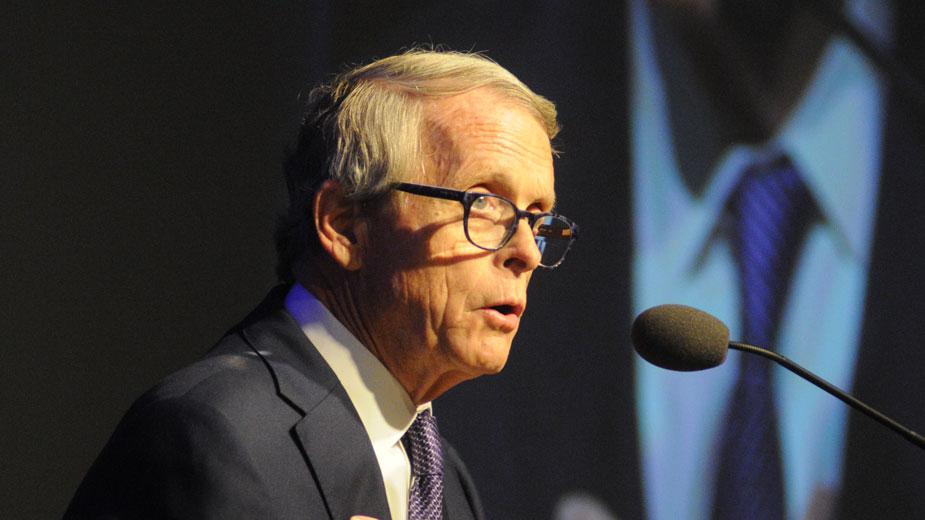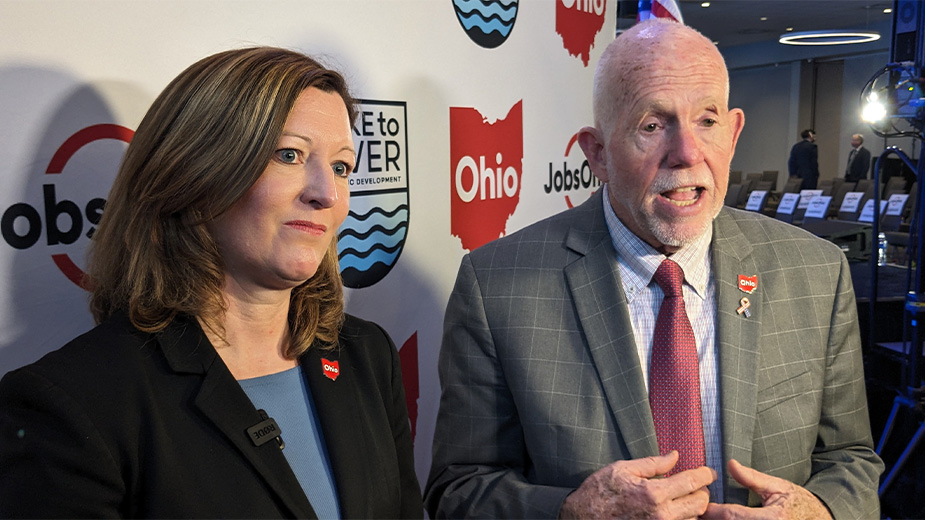DeWine Signals Support for Future of Lordstown Plant
BOARDMAN, Ohio – Gov. Mike DeWine pledged state assistance for the idled General Motors Lordstown Complex, whether that means a new GM product at the plant or another entity that would take over the building.
DeWine said he was optimistic about the future of the Mahoning Valley during remarks before members and guests of the Youngstown/Warren Regional Chamber at its Salute to Business breakfast Thursday.
“We know how important this is to the Mahoning Valley, how important it is to the state of Ohio,” DeWine said.
State officials are involved in “behind the scenes” discussions regarding the GM Lordstown plant, which manufactured the Chevrolet Cruze until early March, when GM discontinued production of the model, the governor said.
“We’ve made very clear to General Motors from the beginning that we will support them if they put another line into Lordstown,” DeWine said yesterday. “If that’s not going to happen, we’ve also made it clear that any company that has the ability to come in and buy the facility and start up manufacturing again, we’re going to help them.”
James Dignan, president and CEO of the Regional Chamber, noted that he and other officials from the chamber met with DeWine two days after he was sworn in as governor.
Lordstown Motors, a new company being founded by Steve Burns, former CEO of electric truck manufacturer Workhorse Group Inc., has discussed purchasing the Lordstown plant from GM. Lordstown Motors would license Workhorse’s technology and manufacture vehicles at the Lordstown plant.
“It’s a very viable alternative,” DeWine said. “I think it’s a very viable company.”
The state is “in communications” with Lordstown Motors, which is now raising the capital needed to launch the company, just one part of the ongoing process.
As Lordstown Motors and Workhorse continue their discussions, negotiations are ongoing with the United Auto Workers, which has to sign off on any sale of the Lordstown plant, said state Sen. Sean O’Brien, D-32 Bazetta.
“I just talked with General Motors [Wednesday] and everything’s just on standby until after the negotiations go forward with the UAW,” he said.
The UAW negotiations are set to conclude Sept. 14, according to state Sen. Michael Rulli, R-33 Salem. “That’s the magical day. We’re all on pins and needles until that day,” he said.
As yet, Lordstown Motors has not indicated what kind of assistance it might seek from Ohio or if it would, though officials have been in discussions with JobsOhio, O’Brien said.
“They have indicated that their big focus is raising the money to get this done and get in with the UAW to get in these negotiations and be a part of them … so they can get in the building and move in as soon as possible,” he said.
“I’m cautiously optimistic,” DeWine added, “about where we’re going from there but my commitment to you is the state will play its role. We will be the good partner and we will do everything we can to assist whoever is going to go in there.”
He also expressed his optimism Thursday for the future of the Mahoning Valley. The governor – who has visited the Mahoning Valley on several occasions over the years as U.S. senator and, more recently, Ohio attorney general – said he has never seen the Valley as united as it is now. Business, political and labor leadership is “really coming together” to set specific goals.
“That is really what is very important,” he said. “It makes my job a lot easier when you have people coming together and listening to what their priorities are.”
Beyond that, DeWine said he was also optimistic about the impact from the shale play in eastern Ohio and construction of a cracker plant in Belmont County, which is expected to create local opportunities; military assets such as Camp Garfield and the Youngstown Air Reserve Station; and even the quality of the incoming class at Youngstown State University, as expressed to him by YSU President Jim Tressel the night before.
The governor discussed provisions in the biennial budget such as investments in early childhood education and $675 million over a two-year period for wraparound services such as mental health services in schools. Teachers say they can educate kids, but what is happening outside school can get in the way of their ability to teach, DeWine said.
The budget also has funds for addressing the opioid epidemic. Preventing addiction, not just to opiates but other substances, is “the best way to go by far,” he said.
He briefly discussed his 17-point plan to address gun violence in Ohio, which he introduced shortly after visiting Dayton in the aftermath of the Aug. 4 shooting that left 10 people dead, including the shooter.
“Each and every one of them will make a difference,” he said. Each also will pass constitutional muster, he pledged.
Provisions of the plan include personal protection orders to remove guns from individuals determined through due process to be a danger to themselves or others. No weapons would be taken without a court order issued by a judge based on evidence, and he is working on language with “the Second Amendment community,” he said.
He also called for entering each of the 500,000 outstanding criminal warrants in Ohio into statewide and national databases. Currently, less than half of those warrants are entered into the statewide database and just 18,000 are in the national database.
“We’re going to change that,” he said.
Copyright 2024 The Business Journal, Youngstown, Ohio.



